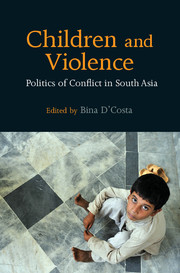Book contents
- Frontmatter
- Dedication
- Contents
- List of Map, Figures and Tables
- Acknowledgements
- Introduction: ‘Turtles Can Fly’: Vicarious Terror and the Child in South Asia
- Part I Shaping Childhood in South Asia
- Part II Conflict and Violent Peace
- Part III Rights, Needs and Protection
- Part IV Reflections from Human Rights Advocates in the Region
- 11 Being Young in a Time of Conflict: Kashmiri Youth and Children – A Reflection
- 12 The Killing of Youths in Sri Lanka: Historical Wrongs and the Failure of the State
- 13 The Impact of War and Violence on Young Minds
- Bibliography
- Notes on Contributors
- Index
11 - Being Young in a Time of Conflict: Kashmiri Youth and Children – A Reflection
from Part IV - Reflections from Human Rights Advocates in the Region
Published online by Cambridge University Press: 05 June 2016
- Frontmatter
- Dedication
- Contents
- List of Map, Figures and Tables
- Acknowledgements
- Introduction: ‘Turtles Can Fly’: Vicarious Terror and the Child in South Asia
- Part I Shaping Childhood in South Asia
- Part II Conflict and Violent Peace
- Part III Rights, Needs and Protection
- Part IV Reflections from Human Rights Advocates in the Region
- 11 Being Young in a Time of Conflict: Kashmiri Youth and Children – A Reflection
- 12 The Killing of Youths in Sri Lanka: Historical Wrongs and the Failure of the State
- 13 The Impact of War and Violence on Young Minds
- Bibliography
- Notes on Contributors
- Index
Summary
After the outbreak of increased armed resistance in Jammu and Kashmir in the 1980s the level of state militarization has increased to unprecedented levels. This widespread militarization has been acknowledged by the United Nations, describing Kashmir as ‘the most militarized zone of the world.’ The deep militarization has adversely affected every section of society irrespective of difference in terms of age, sex, income, education, social status and so on. Almost every individual, family and clan has suffered and been touched in one way or the other.
Over the last 24 years approximately 700,000 Indian military and paramilitary forces have been based in these areas, both to counter combatant Kashmiris as well as non-Kashmiris, but also to intimidate and control the entire civilian population. This is part of the State doctrine of ‘Sub-Conventional Warfare’, which aims, inter alia, to break the will of Kashmiris as a whole. Despite the decrease of militancy in the valley, the level of militarization has remained the same. The Government of India justifies this position by arguing that discontent in Jammu and Kashmir can explode at any time such as was seen in the 2008 mass uprising over land transfer and in the 2010 protests over the infamous Machil encounter. Arguably, however, the army's presence is largely politically motivated.
The army during its campaign has participated in gross human right violations: 70,000 people have been killed, more than 8,000 people have been subjected to enforced or involuntary disappearances and torture has been widespread in military and paramilitary camps across the valley. It is a state of war. Increasing rates and use of rape, molestation, and overall systematic and institutional repression has also been a direct result of this militarization. Human rights violations have been systematic and used as a matter of policy. All institutions of the state including the judiciary, executive (army, police) and legislature have also been deeply implicated in the use of human rights abuses. Legislative impunity has also been granted controversial Armed Forces (Special Powers) Act, AFPSA, which gives license to arrest or kill on mere suspicion. Under this Act, those armed troopers who are found to be involved in human rights violations cannot be prosecuted without prior sanction from the Government of India. To date, not a single case of human rights violations has been sanctioned for prosecution.
- Type
- Chapter
- Information
- Children and ViolencePolitics of Conflict in South Asia, pp. 276 - 279Publisher: Cambridge University PressPrint publication year: 2016



